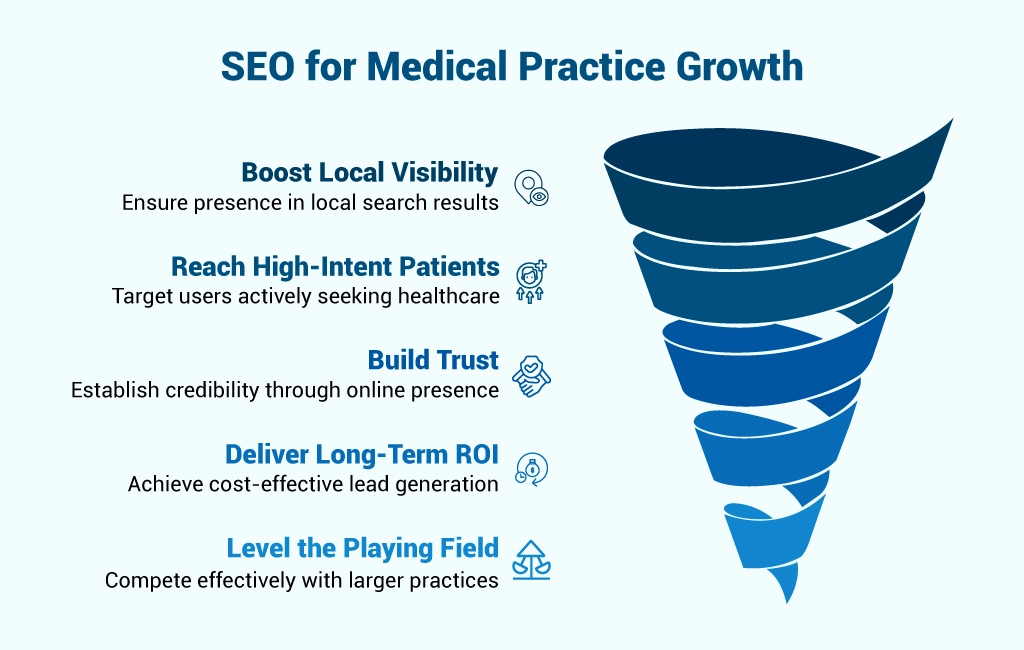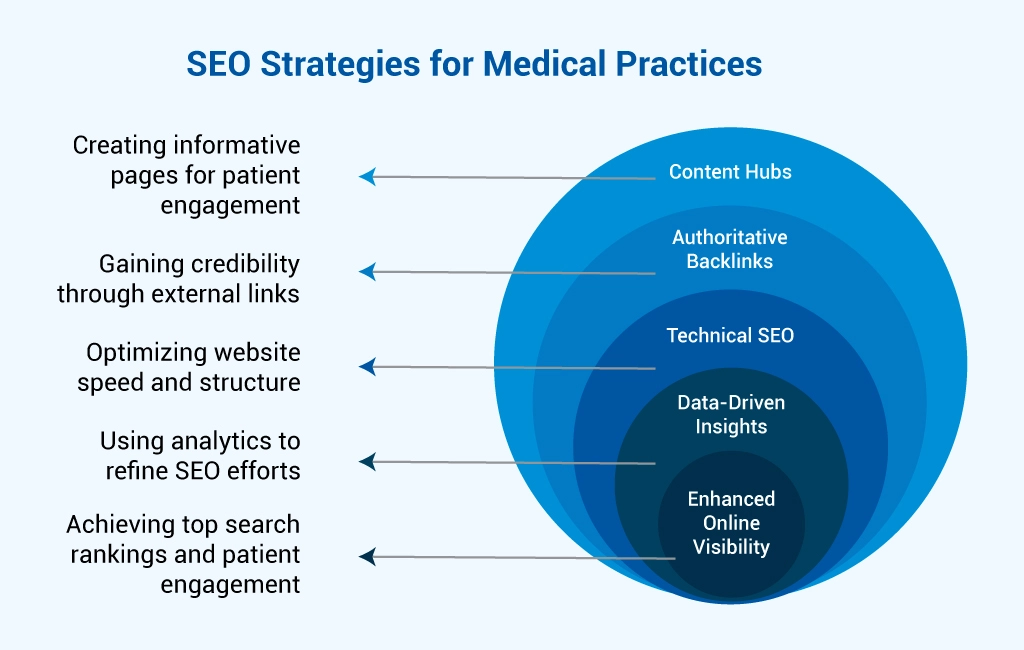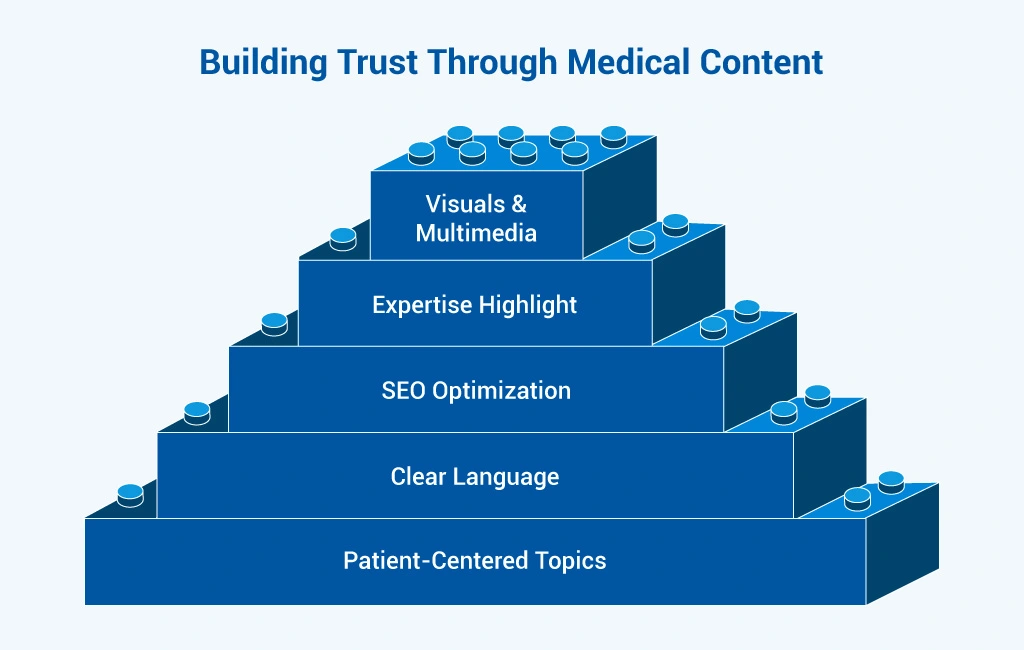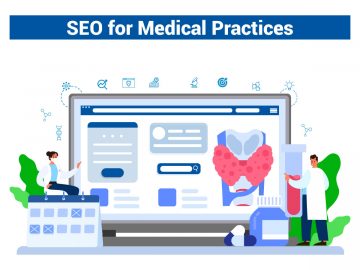When people need a doctor today, they don’t flip through the phone book anymore, instead they take their phone and just Google it. They either look for “dentist near me” or “best pediatrician in [town]”. Hence, if your practice isn’t showing up for similar services, it means you are missing out.
This is where SEO for medical practices comes in!
From optimizing the Google Business Profile to creating content that answers patient questions, a smart medical SEO strategy helps you attract more local traffic and grow the patient base, organically.
Want to know more? Keep reading!
The Importance of SEO for Medical Practices
Nowadays, showing up online for your medical practice growth is no longer optional, it is a necessity. After all, if your practice doesn’t rank in the search results, you are more likely to lose patients to your competitors, no matter how good you are.
Here’s why investing in SEO for medical practices is super important:

Boost Local Visibility
More and more people search for care within their immediate area.
And a solid SEO strategy makes sure your practice appears in map listings, local “near me” results, and city-specific searches—putting you right in front of the people who are looking for you and ready to book the moment they find you.
Reach High-Intent Patients
Unlike social media marketing or broad campaigns, SEO for medical practices targets users actively searching for healthcare solutions.
That means, the more traffic you get from search engines, the more often they are ready to convert into actual appointments.
Builds Trust Before the First Appointment
Your online presence is your digital waiting room. And a well-optimized site with fast loading times, mobile-friendly design, clear services and helpful content reassures visitors that your practice is credible and professional.
Delivers Long-Term ROI
While paid advertising stops the moment you stop spending, SEO for medical practices doesn’t stop.
Rather, it works in the background 24/7. And with time, it indeed becomes one of the most cost-effective ways to generate leads, build brand awareness and reduce dependency on ad spend.
Levels the Playing Field
Even if you are a small or offer independent practice, SEO for medical practices gives you the ultimate power to compete online with larger hospitals or multi-location clinics. All you need is the right strategy and consistency to beat the big giants in the area.
Proven SEO Strategies for Medical Practices
Once you are done with the basics, it’s time to take your online visibility to the next level—advanced medical SEO strategies. They can help you move beyond the competition and drive steady, long-term growth.
Below is a list of the proven SEO strategies to achieve real results:

Build Condition- and Service-Specific Content Hubs
Instead of just listing your services, make sure to create rich, informative pages centered around particular conditions and treatments your practice offers. These “content hubs” answer patient queries, improve search visibility and position your practice as a trusted source.
For instance, rather than using a single “Dermatology Services” page, publish detailed guides on acne treatment, eczema management and mole removal. As a result, each page targets different keywords along with meeting specific patient needs.
Optimize for Multi-Location or Regional Visibility
In case you serve more than one city or neighborhood, generic location mentions won’t just cut it out. In fact, you will need dedicated landing pages optimized for each location, complete with localized content, structured data and reviews tied to that branch.
How does it work? Well, Google tends to favor companies that clearly serve a particular community and patients trust local results over the generic ones.
Earn Authoritative Backlinks from Health-Focused Sources
Backlinks from reputable websites are always one of the powerful ranking factors. And why not!
Getting featured in local directories, medical blogs and professional associations certainly plays a big role in boosting your SEO along with your reputation. Hence, make sure to publish original content or expert interviews that health publishers would want to link to.
Prioritize Technical SEO and Page Performance
Google now rewards sites that are super fast, mobile-friendly and have easier navigation.
Meaning, optimizing page speed, securing your website with HTTPS, fixing crawling errors and making sure website structure makes sense, for both users and search engines. After all, technical problems hurt rankings and drive potential patients away in rocket speed due to poor user experience.
Let Data Guide Your Strategy
Success with SEO for medical practices isn’t just about what you publish, it’s more about how well it performs.
Hence, use tools like Google Analytics, Search Console and heat maps to understand what’s really working, where users drop off and which keywords are actually converting into actual appointments.
Creating High-Quality Content for Medical Practices
In healthcare, trust is literally everything. And the content you publish online plays a massive role in building that trust before a patient even walks through the door. Besides, Google favors content that’s helpful, accurate and written with real people in mind—not just search engines.
Here’s how to do it right:

Focus on Patient-Centered Topics
Great medical content begins with understanding what your patients are really searching for. Hence, write about the conditions, treatments, symptoms, FAQs about what your patients are already asking about.
For instance, “What does a sinus infection feel like?”, “When should I see a cardiologist?” or “How long does it take to recover from cataract surgery?”
Use Clear, Conversational Language
While it’s important to show medical terms and your clinical expertise, your content always feels clear, compassionate and easier to understand. Therefore, break down complex topics into simple language and explain the terms where required.
Optimize with SEO Best Practices
Effective medical content marketing perfectly blends value with online visibility. Meaning, write for people first, but keep SEO in mind!
How to do it? Use relevant keywords naturally, write compelling meta descriptions, and organize content with headers (H1s, H2s, etc.) to enhance readability and searchability.
Highlight Expertise and Credentials
Mention certifications, experiences and treatment outcomes whenever relevant. Why? Well, this will help to add good value and authority to your writing and boost up the credibility in the eyes of both readers and search engines.
Add Visuals and Multimedia When Possible
Images, diagrams, or short explainer videos can help simplify complex procedures and increase engagement to a great extent.
Advanced Technical SEO for Healthcare Websites
Technical SEO healthcare strategies are basically the behind-the-scenes mechanics that help your content get discovered, indexed and, most importantly, ranked by search engines. And they matter just as much as the content itself.
Let’s take a look at some of the advanced techniques every healthcare website must consider:
Improve Site Speed and Mobile Performance
Healthcare websites must load quickly and perform flawlessly on mobile devices—because that’s where most health-related searches begin.
After all, patients don’t have time to wait, especially if they are looking for urgent care or specialist information.

What to do?
- Compress images and use next-gen formats (like WebP)
- Minify CSS and JavaScript
- Enable browser caching
- Choose a fast, HIPAA-compliant hosting provider
Use responsive design for seamless mobile usability
Build a Clean, Logical Site Structure
The more organized your site is, the easier it is for both users and search engines to navigate. In healthcare, this means grouping services by category, using descriptive URLs, and avoiding buried or orphaned pages.
Best practices
- Create individual pages for key services (e.g.,/services/orthopedic-surgery)
- Use breadcrumb navigation for better user orientation
- Avoid long, messy URL strings
Ensure Site Security and HTTPS Compliance
Security is essential in the medical field. If your site isn’t encrypted, Google will flag it—and potential patients may leave before ever reading a word.
What to do?
- Ensure your SSL certificate is active and renewing properly
- Use HTTPS site-wide—not just on forms or login pages
- Update internal links to use secure URLs
Implement Schema Markup for Richer Results
Schema is a type of structured data that helps search engines understand your content contextually. In healthcare, it’s especially useful for enhancing provider profiles, reviews, FAQs, and business listings.
Use Schema for
- Medical clinics or health organizations
- Doctors’ names and specialties
- Business hours, accepted insurance, and contact info
- Frequently asked questions (FAQPage schema)
Monitor and Fix Crawl and Indexing Issues
Even well-designed websites can have hidden technical issues—like broken links, duplicate pages, or blocked content—that hurt search performance.
However, routine audits can help you catch and fix these before they impact rankings.
Key tools
- Google Search Console
- Screaming Frog SEO Spider
- Ahrefs or SEMrush for deeper technical analysis
Improve Core Web Vitals for UX and SEO
Google’s Core Web Vitals measure how fast and stable your site feels to users. These include:
- LCP (Largest Contentful Paint): Page load speed
- FID (First Input Delay): How quickly users can interact
- CLS (Cumulative Layout Shift): Visual stability during loading
Utilizing Social Media and Online Platforms for SEO
Business can greatly influence your online visibility and patient engagement. This is where social media healthcare strategy becomes a powerful extension of your SEO efforts and this is how you can make the most of it:

Share SEO-Optimized Content to Boost Visibility
When you publish new content on your website—like a blog post on managing back pain or a guide to annual physicals—don’t let it sit in silence.
Make sure to promote it across your social media channels using keyword-rich captions, hashtags, and clear calls to action.
Ensure NAP Consistency Across All Profiles
NAP (Name, Address, Phone Number) consistency is a core element of local SEO for medical practices. That is, your business details should be identical on your website, Google Business Profile, Facebook page, directories like Healthgrades, Vitals, and Zocdoc, and any other online presence.
Show Your Expertise and Human Touch
Patients want to see the faces behind the care!
Hence, use social media to humanize your practice: share behind-the-scenes moments, team introductions, patient success stories (with consent), and health tips from your providers.
Encourage and Respond to Patient Reviews
Online reviews are a huge part of both local SEO for medical practices and patient decision-making.
Therefore, encourage satisfied patients to leave reviews on Google, Facebook, and healthcare-specific platforms. Always respond—especially to negative feedback—with professionalism and empathy.
Use YouTube as a Search Engine (Because It Is One)
YouTube is the second-largest search engine in the world.
Educational videos—like “What to expect from a root canal” or “How to manage diabetes”—can boost your visibility, establish authority, and drive viewers back to your site.
Engage in Local and Niche Communities
Participating in local Facebook groups, health-related forums, or platforms like Reddit can increase brand awareness, drive referral traffic, and create massive opportunities to share your expertise in authentic ways.
Monitoring and Measuring Your SEO Success
To truly grow your visibility and attract more patients online, you need to consistently track medical SEO performance and use that data to guide smarter decisions.
Here’s how to effectively measure your SEO for medical practices success:
Track Organic Website Traffic
Start by monitoring how many visitors are landing on your website from search engines. Use tools like Google Analytics to see where your traffic is coming from and which pages are most popular.
Monitor Keyword Rankings Over Time
Use tools like Google Search Console, SEMrush, or Ahrefs to see where your practice ranks for target keywords—such as “urgent care near me” or “dermatologist in [city].”
Evaluate Local SEO Performance
Your Google Business Profile (GBP) is a huge driver of local traffic. Hence, make sure to monitor GBP metrics like profile views, direction requests, website clicks, and phone calls to find out which is working and what not.

Track Conversions, Not Just Clicks
Website traffic is great—but conversions are better. Use form submissions, appointment requests, or call tracking to measure how many visitors are turning into patients.
Monitor Bounce Rate and Time on Site
If people are leaving your site quickly, it might mean your content isn’t matching their search intent or your site is slow/confusing.
What to check?
- Are your pages loading fast enough
- Is your content clearly answering their question?
- Are visitors clicking deeper into the site?
Audit Technical SEO Health
Use tools like Screaming Frog or Sitebulb to check for broken links, crawl errors, missing metadata, and slow-loading pages.
Besides, keeping your site technically sound ensures Google can properly index your content and keeps users happy too.
Set Up SEO Dashboards for Ongoing Reporting
Create a custom SEO dashboard using tools like Google Looker Studio or AgencyAnalytics to bring all your data together in one place—traffic, rankings, conversion goals, and page performance.
Common SEO Tips to Avoid Mistakes in Medical Practices
Even small SEO missteps can hurt your visibility and cost you patient leads. Below is a list of the most common medical SEO errors to avoid—and quick fixes to keep your strategy, right on track:
- Ignoring local SEO optimization: Skipping local keywords and Google Business updates means missing nearby patients. Keep your listings accurate and ask for reviews.
- Using complex medical jargon without context: Overly technical language confuses patients. Use plain English and explain procedures simply to build trust.
- Publishing duplicate or thin content: Repeating or shallow content hurts rankings. Create unique, valuable pages that answer specific patient questions.
- Skipping basic on-page SEO elements: Missing title tags, meta descriptions, or internal links weakens your site. Use keywords and structure pages for easy searchability.
Neglecting mobile optimization: If your site isn’t mobile-friendly, you will lose users and rankings. Ensure fast load times and easy navigation on phones. - Failing to monitor SEO performance: Without tracking, you won’t know what’s working. Use Google Analytics and Search Console to guide ongoing improvements.
Overlooking E-E-A-T principles: Lack of credibility can hurt health content. Hence, make sure to include author credentials, cite trusted sources, and keep content updated.
When to Seek Professional Help with Medical SEO?
While it’s possible to handle basic SEO tasks on your own, medical SEO often requires more than just a few blog posts and keyword tweaks.

Between strict industry regulations, patient-focused messaging, and constant changing algorithms, getting it right takes time, consistency, and a strategic approach.
If any of the following sound familiar, it might be time to bring in an expert:
- You are regularly outranked by local competitors despite having better service or reviews.
- You are publishing content but seeing little to no increase in traffic or patient inquiries.
- You are unsure how to optimize for competitive keywords or manage ongoing SEO tasks.
- Technical SEO terms like schema, page speed, and crawl errors feel overwhelming.
You simply don’t have the time to monitor and adjust your SEO strategy regularly.
Outranking competitors takes more than effort—it requires expert strategy and industry insight. If you are unsure how to move ahead, partnering with professionals can save you time and grow with confidence.
Talk to an Expert → and find out how professional SEO services can help your medical practice grow smarter, faster, and stronger online.
Wrapping Up
With a well-structured SEO strategy, your medical practice can increase their online visibility and credibility manifold times, that too without paying for ads.
It doesn’t matter if you are just getting started or looking to improve your current efforts, what really matters is taking action. Because when your practice shows up where and when people are searching, everyone gets benefitted.








